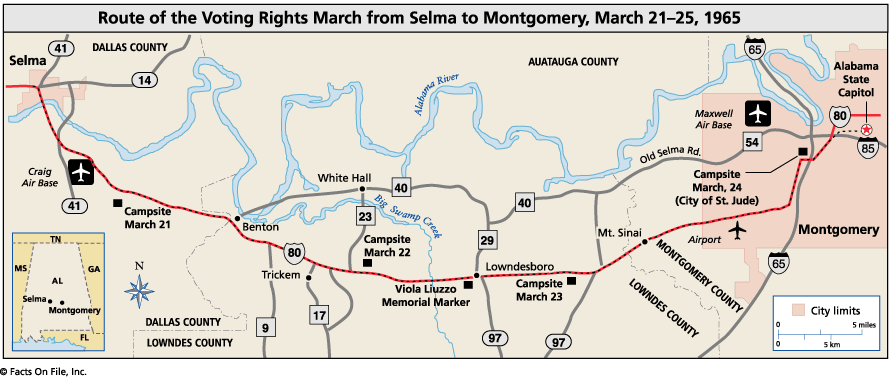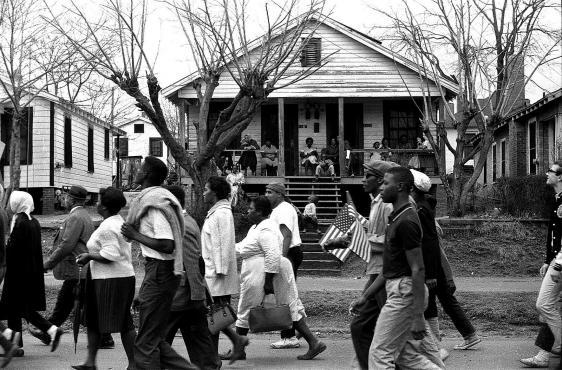By Ann Margaret Anselmo
This is the fourth blog in our series on the Civil Rights Movement.
The story of my historic march to Montgomery, Alabama, began on the Feast of St. Joseph (March 19) in 1965. Early in the afternoon that day, I walked over to the Department of English office where, with great relief and little ceremony, I turned in three copies of my dissertation which the official readers were to examine. When I returned to the convent, I found a note on our “Emergency” bulletin board reporting that a School Sister of Notre Dame (SSND), Sister Peter, had called from Memphis, Tennessee, to urge all the sisters who possibly could to go to Selma for the march.
For several days a persistent tune had been playing in my mind: “I wish I could go to Selma!” And now here was the invitation, in black and white, pinned to the small square board where most of our crises were announced. … In a few minutes I was talking to Reverend Mother in Connecticut [to ask permission]. She acted to my proposal like a truly updated Mother General, hesitating only long enough to remind me that I might find myself either in danger or in jail—or both. When I assured her that I was aware of these possibilities, she gave her consent and cautioned—“Try not to catch cold.”

The travel arrangement which followed are too numerous to relate in great detail. … Since only 300 were being allowed by authorities to march on the stretch leading to City of St. Jude … Dr. Martin Luther King had advised that others come down for the last lap from St. Jude’s to the Capitol.
… We arrived at a cross-section of streets that was heavily lined and guarded by federal troops whose ominous expressions were entirely in keeping with the guns they held militantly in front of them. We poured off the buses and were immediately put into rows of fours …. The first portion of the march was past dilapidated houses that would suggest any scene from Tobacco Road. The Negroes sat on their gray and shaky porches, all ages …. Some smiled, most of them waved and shouted thanks to us for coming. Others seemed tired and weary, but it appeared to be the fatigue of generations, not any tiredness which came from viewing 35,000 marchers troop past their shanties…
At one point I was marching beside Monsignor Cantwell …. A white woman from the side of the street, her face horribly contorted by the hate in her heart, spat out to Monsignor: “Father, you should be ashamed of yourself. Why don’t you go home and pray for your sins.” Monsignor, a very mild, unassuming man, smiled and said to the heckler, “Will do.” For anyone who has intimately known Love incarnate, this Hate incarnate was a shocking revelation.
… Every once in a while we sang freedom songs and this made the march seem shorter, although four miles isn’t very far with or without diversion, and there was so much to see along the way. From the Jefferson-Davis Hotel, for instance, we saw white men staring sullenly at us as we passed. Directly above them, unobserved by anyone but the marchers, were open windows framing Negro busboys and hotel employees in their smart-looking livery and broad smiles. Their enthusiastic waves registered appreciation to us for our being there. This contrast of the Negro’s enthusiasm and the white man’s disgust was clearly symbolic of the deeply felt love and equally intense hatred which we met at every step. The whole experience was, in fact, one of contrasts, paradoxes and incongruities. How to explain so much love and so much hatred on the same free soil!
… A minister had pointed out to me several minutes earlier that the large white dome in the right distance was our destination—the Alabama State Capitol building. … The flag pole from the dome witnessed to the fact that we were in Alabama and that we were here to gain rights in a state where confederate traditions were valued above its human citizens, for there in the sultry southern breezes waved the state flag and below it the Confederate banner. There was no sign of Old Glory.
…At 4:30 we all crossed our arms and linked hands while we sang the Civil Right song, “We Shall Overcome.” I wasn’t sure at that moment how much or just what we had overcome, but I knew I had been overcome by the most real experience of the fatherhood of God and the brotherhood of man that I had ever known in my life.
